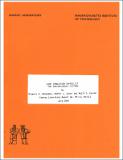| dc.contributor.author | Adekugbe, Oluwole A. | en_US |
| dc.contributor.author | Schor, Andrei L. | en_US |
| dc.contributor.author | Kazimi, Mujid S. | en_US |
| dc.date.accessioned | 2011-01-14T22:37:15Z | |
| dc.date.available | 2011-01-14T22:37:15Z | |
| dc.date.issued | 1984 | en_US |
| dc.identifier.uri | http://hdl.handle.net/1721.1/60586 | |
| dc.description.abstract | A one-dimensional loop simulation capability has been implemented in the thermal-hydraulic analysis code, THERMIT-4E. This code had been used to simulate and investigate flow in test sections of experimental sodium loops and of LMFBR fuel assemblies. Such analyses had required the use of boundary conditions specified at the inlet and outlet. The new code, THERMIT-4E/L simulates the entire primary coolant loop and therefore eliminates the need to specify such boundary conditions. The additions and modifications to the THERMIT-4E code include: constant temperature heat sinks, implicit heat transfer to environment and generalized body force field specification. To date, applications have been focused on natural circulation. | en_US |
| dc.description.abstract | A series of experiments performed in the Sodium Boiling Test Facility (SBTF) at the Oak Ridge National Laboratory have been simulated with the loop code. The results of single-phase calculations are generally in good agreement with the experimental data. However, we have not as yet been able to obtain a stabilized flow configuration when a significant amount of boiling takes place in the heated section. It appears that the extremely violent condensation n the plena loads to the .noted calculational difficulty. | en_US |
| dc.description.abstract | An analytical treatment approximating the single-phase loop behavior has also been developed. The results are quite general and can be applied to other loop systems. Approximate expressions have been obtained for the frequency and damping coefficient of a flow oscillation in a loop. The analysis has also yielded a criterion for stability, dependent on the input power, difference between the upper and lower plena temperatures, and a modified Stanton number. | en_US |
| dc.format.extent | xv, l90 p | en_US |
| dc.publisher | Cambridge, Mass. : Energy Laboratory and Dept. of Nuclear Engineering, Massachusetts Institute of Technology, 1984 | en_US |
| dc.relation.ispartofseries | Energy Laboratory report (Massachusetts Institute of Technology. Energy Laboratory) no. MIT-EL 84-013. | en_US |
| dc.title | Loop simulation capability for sodium-cooled systems | en_US |
| dc.title.alternative | Sodium-cooled systems and loop simulation capability. | en_US |
| dc.identifier.oclc | 12111774 | en_US |
